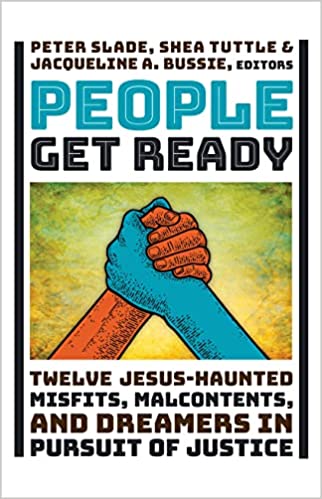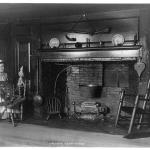We are back with another installment!
Last month, I wrote about Eerdman’s Press’ new People Get Ready: Twelve Jesus-Haunted Misfits, Malcontents, and Dreamers in Pursuit of Justice, a collection of theological biographies of prominent figures in American life. We heard about people as varied as Bruce Klunder, Tom Skinner, Rachel Carson, Allan Tibbels, and Mary Paik Lee. This time we have some household names–Flannery O’Connor, Pete Seeger, Toni Morrison–and others–Sarah Patton Boyle, Jack Egan, and Ramon Dagoberto Quinones–virtually unknown. As with the last bunch, each figure offers us a reflection on the relationship between faith and society, between the eternal and the personal, a messy concoction of people who insist on being of some use, borrowing from Bonhoeffer.

In the forward, Charles Marsh, Commonwealth Professor of Religious Studies at the University of Virginia and founder of the Center for Lived Theology, writes that the book “directs our attention to twelve people…who followed the example of Jesus into spaces marked by oppression and the tyranny of death, and there made manifest God’s love for all that God made.” It should be no surprise that in following this way of Jesus, these people were odd, out-of-step with the times, sometimes prophetic, sometimes radical, but mostly out-of-place. They were weird workers for and witnesses of the new kingdom.
(*Full disclosure, I contributed the first chapter, but I think the other scholars’ contributions are of such value that I hope you’ll forgive me for publicizing!)
Jacqueline A Bussie, executive Director for the Collegeville Institute for Ecumenical and Cultural Research, writes about how fell in and out and back in love with Flannery O’Connor. This sort of honest reckoning with the beloved saints of old is something of a necessity these days and Bussie shows us how it can be done. A long-time admirer of O’Connor, Bussie expectantly began reading her unedited letters when “immediately disenchantment and disappointment slapped [her] across the face.” The private O’Connor was maddening: elitist, politically conservative, homophobic, critical of antiracist and pacifist activism. Worse, she herself was, in Bussie’s estimation, “well…racist.” Thoroughly disillusioned, Bussie opened O’Connor’s prayer journal, and there found a mysterious, unexpected grace. Insecure and ambitious, O’Connor’s prayers are filled with pleas that God give her a story, that He make her a “fine writer”, and, of course, that she be published. Perhaps pretty standard fare for writers, except for O’Connor’s apparent sincerity. Bussie urges us to take her “theological claim seriously: that O’Connor didn’t create her fiction but instead received it”. This, not her personal character, is what accounts for the writing’s prophetic insights. She was never a saint, and she knew it all along. It was we who forgot. In the end, the compelling chapter is a hard reminder that “God’s grace, contrary to warm platitudes, greets us more like a gut punch.”
Peter Slade, Professor of Christianity at Ashland University, lets folk-singer and activist Pete Seeger’s life unfold as we walk with him from Selma to Montgomery. Detailing Seeger’s role in the Popular Front, his interactions with HUAC, his enduring “love” for communism, Slade unearths a man full of belief in the power of song as “an indispensable resource for struggle.” Improvising verses from union songs, church songs, and school songs, Seeger and his fellow marchers– John Lewis, Bernice Johnson Reagan, unnamed teenage girls– ad-libbed through Alabama, participating in what Seeger called “a “singing movement.” The experience, Slade writes, worked something of a conversion in Seeger. If nothing else, the struggle against racial capitalism, against militarism and exploitation, need to not be joyless.
In a deeply textual and deeply personal reading of the life and work of Toni Morrison, professor emerita at Goshen College Ann Hostetler draws out the “embedded theology” in the (now-censored) novelist. Through working, moving, teaching, mothering, Morrison discovered writing a solace. But the practice was not just for her. Rather, Hostetler writes, her fiction was “an act that served the community, the African American community in particular.” A Catholic, Morrison’s work engages with notions of human dignity, of good and evil; her stories “engage with the forgotten, the overlooked, the wounded, the despised. They invite readers to vicariously embody the thoughts, emotions, and experiences of Black women.” It’s an invitation to moral imagination. Hostetler invites us too– into Morrison’s capacious mind, her open heart, her office full of cigarette smoke and probing questions and generous love.
Loyola University professor Dan Rhodes’ chapter on Father Jack Egan begins like a thriller: the Cardinal sent him to Chicago “with the hopes that it might kill him.” Having recently recovered from a heart attack, Father Egan surveyed his new parish: recently vacated by middle class whites, it was now all- Black, poor, crime-ridden, a “neighborhood in quick, almost calculated, decline.” But, Rhodes shows, Egan found that he and the community, bound together, were “not bereft.” In his captivating description of Jack Egan’s ministry, and especially his involvement with the Contract Buyer’s League, Rhodes reminds us of the power of listening, of reciprocity, that the power needed to fight structural injustice might yet exist in the “storm cloud of fellow witnesses.”
As associate professor of Christian spirituality at Duke Divinity School Lauren Winner explains, Sarah Patton Boyle was slow in becoming “the most outspoken white integrationist in Virginia.” An upper-class white woman, the daughter of an Episcopal priest, the wife of a University of Virginia professor, a mother of two boys, an employer of household help and an upholder of the South’s racial norms, for many decades it certainly seemed unlikely that Boyle would wind up launching an antiracist “epistolary assault on Vriginia’s newspapers.” But at the age of forty four, already a writer, Boyle realized that Gregory Swanson would be integrating UVA, that that reality might free her and everyone else, and, upon meeting him, that she had a lot to learn and unlearn. Winner’s gorgeous prose invites us along on Boyle’s earnest, pragmatic, sometimes offensive, mostly lonely effort to “ghostwrite the South into integration.” Having awoken to the evils of white supremacy, Boyle wrote letters to the editor, articles, a memoir, kept saying it “over and over.” In doing so, she offers a place to start– even if it’s late–to do better.
In her chapter “Jesus is my Coyote,” Loyola University professor M. Therese Lysaught presents the powerful case of Padre Ramon Quinones. Quinones pastored in Nogales, Sonora, Mexico for many years, welcoming the poor and displaced refugees fleeing violence and lack, participating in the so-called sanctuary movement, which he considered his “priestly duty.” As Immigration And Nationality Services under President Reagan instituted a policy of denying Central Americans asylum, Quinones felt called not only to provide care at his church but to “be more intentional about helping [refugees] evade capture at the border” on their way to a sister church in Arizona. In describing the Sanctuary movement and its legal persecution, Lysaught begs complexity into stale, partisan conversations about religious freedom and challenges us to remember those neighbors to love waiting along the border.
Though I got to hear and even read drafts of some of these stories along the way, I found reading these varied testimonies of faithfulness and justice deeply moving. Even here, in unpredictable times, in our unreliable selves, God is at work.
Get the book and let me know what you think!
You can also hear Tisby, Tuttle, Slade and Bussie discuss the project here.













